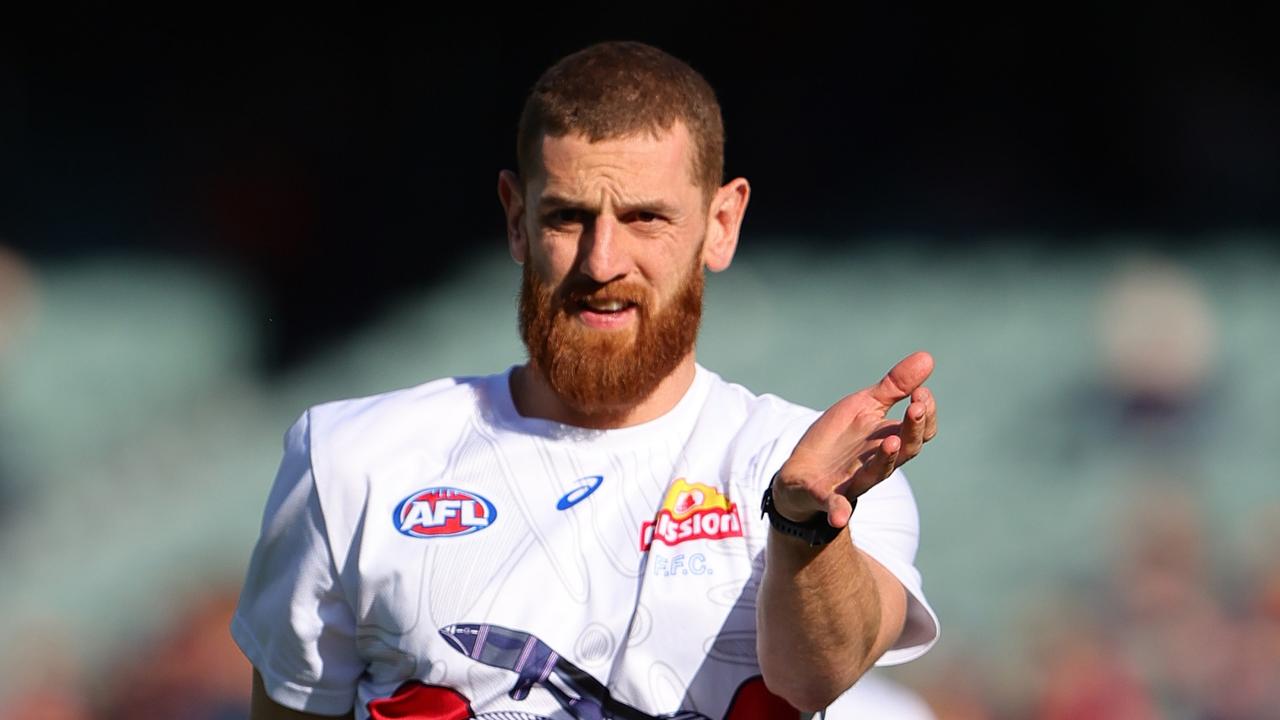Mick Malthouse says slumps aren’t forever and AFL finalists need to find momentum when it matters
Three-time premiership coach Mick Malthouse knows a thing or two about form fluctuations. He writes slumps can come about for a number of reasons — but clubs can rebound if they take a different approach.
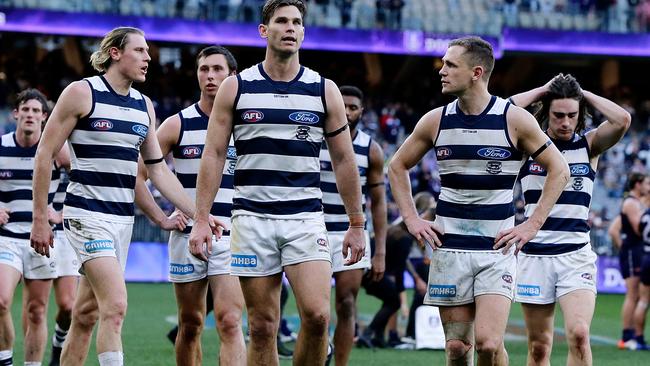
AFL News
Don't miss out on the headlines from AFL News. Followed categories will be added to My News.
Don’t worry about the dialogue coming from Geelong that the club is not in a slump. It has been in a form slump.
But it’s not all doom and gloom for the Cats.
Regardless of tonight’s result against North Melbourne, since the bye Geelong has fallen right off with the procedures that had elevated it to a superior place at the top of the ladder.
SUBSCRIBE TO THE SACKED PODCAST SERIES HERE
But everyone needs to remember that a slump isn’t forever. Especially when you are a good team.
The more you worry about a slump the bigger the hole gets, because you take your eye off the methods of playing football the way you want to play it.
My advice: you can’t control what is out of your control, and outside noise is just that.
So worry about what works for you, instead of worrying about what works against you.
Most slumps are circumstantial and come about for a number of reasons:
— The team is content with where it is and loses drive.
— The team is deprived of its best players through injury.
— Younger players become physically and mentally exhausted.
— The opposition is on the rebound and hunting you.
Live stream the 2019 Toyota AFL Premiership Season on KAYO SPORTS. Every match of every round. Live & anytime on your TV or favourite device. Get your 14 day free trial >
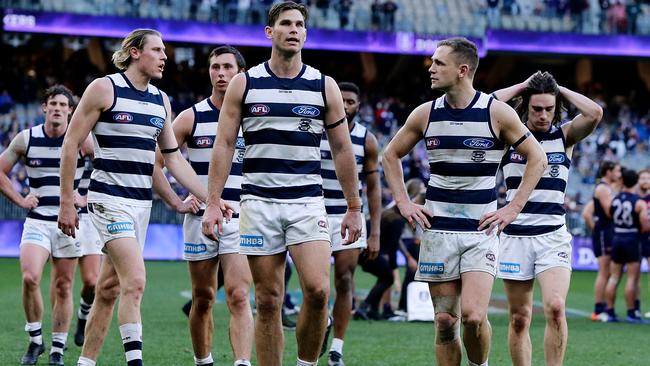
The doubt in a slumping team is not just how an individual feels about himself, but also how he views his teammates. As a result, questions are often raised directly, or secretly.
And it’s the questioning that is dangerous.
I have had experiences with teams in mini and severe slumps.
My first real taste of it was in 1991.
We (the West Coast Eagles) were flying.
Then, many of my players and myself were involved in the Western Australia v Victoria state-of-origin clash, which was huge. We comprehensively beat the Vics.
I realised, much later, however that many of my players saw that as climbing the mountain, and their hunger in the home-and-away season waned.
We still finished top of the ladder but our output wasn’t as effective after the state game as it had been before it. We were three to five per cent off our best, and that’s enough.
We entered the finals with small doubts and were eventually beaten by Hawthorn in the grand final.
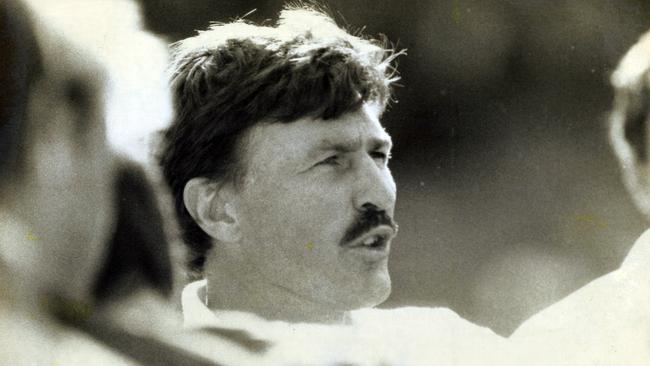
In 2002 at Collingwood, we started to gain momentum and great belief early on, going deep into the year.
But we substantially fell away towards the end of the home and away season, losing five of our last eight games and slipping down the ladder.
Media called it the Colliwobbles; I knew it as a slump, of the great abyss variety.
Our first final was away against ladder leaders Port Adelaide, and to compound things we lost our captain, Nathan Buckley, to an injury.
Our backs were literally to the wall.
The year before we had finished ninth, and the club hadn’t played in finals for a number of years, so the pressure to maintain form and make the eight had become too great for our finals-inexperienced team to handle.
‘I HATE IT’: DANGERFIELD’S FLAG PAIN
CONIGLIO: GIANTS DENY DECISION IS MADE
LIVE LADDER: TIGERS GIVEN HUGE LEG-UP
Entering the first final we reversed a lot of our thinking from being result-driven to being job driven.
We’d made the finals, now for the games.
Every player had a job, a role to play, and his mind was focused entirely on that.
Paul Licuria had the job of stopping Brownlow favourite Josh Francou.
Anthony Rocca and Chris Tarrant had to concentrate on being competitive without worrying about a certain number of goals to kick.
Simon Prestigiacomo and Shane Wakelin had to minimise the output of their direct dangerous opponents.
Instead of being weighed down with worries about the result, our players focused on doing their job for the team.
And it worked, remarkably well.
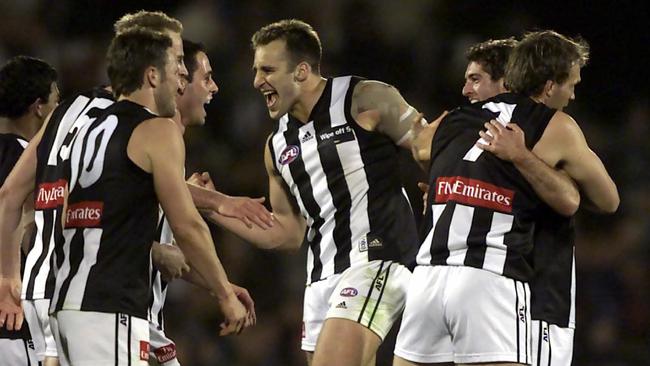
In a complete reversal of form we beat Port by 13 points, and the confidence gained from that propelled us through the preliminary against Adelaide and into a grand final.
So in a way the slump reset our agenda.
I’m convinced that the players, until then, had been thinking, “we are so close, but we aren’t there yet.”
They were worried about IF we were going to make the finals instead of focusing on HOW we would make it.
The Cats need not worry about making the top four, that is a given at this stage.
They need to concentrate now on their processes and what each player is expected to do on game day.
They have a solid game plan, an abundance of top-quality players, still one of the best backlines in the competition, and their forwards are as good as any who can kick 16+ goals a game.
No doubt Chris Scott has already addressed this, and with two games remaining, one at the GABBA and one at GMHBA stadium, they have a chance to recapture that team confidence ahead of finals.
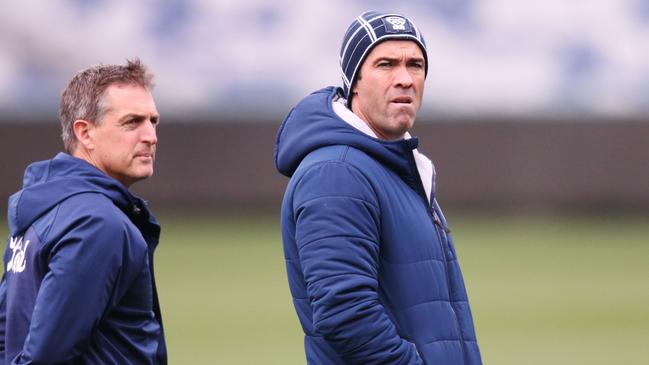
Likewise, Collingwood. Having dropped from second on the ladder to sixth, I feel that noise from outside regarding injuries may have permeated the camp.
This is not the doing of the club, but if enough noise is made around you it’s hard not to hear it.
It seems that there is such a negative vibe surrounding the injuries at Collingwood, more than any other club.
Greater Western Sydney’s injuries hardly get a mention and yet they are just as debilitating, as were Richmond’s not long ago.
The look on Nathan Buckley’s face when the Pies beat Gold Coast was one of pure relief. That win effectively got them in to the finals.
Collingwood can now focus on game strategies each week, as opposed to worrying about making the eight.
Richmond is in direct contrast to a slump, as are Brisbane.
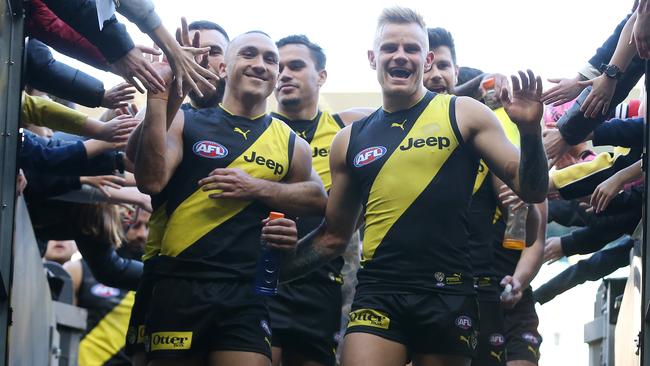
There is great belief in both camps, only marginally ahead of West Coast.
The momentum of these teams is palpable. Doubt versus confidence is highly visible for all to see.
No one expected the Western Bulldogs to win the premiership from seventh spot in 2016.
Few expected Richmond to take home the cup from third in 2017.
West Coast, in second, was recognised as a good club but not potentially a premiership side last year.
Talk at the moment is all about Richmond and West Coast, or possibly Geelong or Collingwood.
Everyone is very dismissive of GWS and the spirited, energetic, youthful Lions’ side.
But recent history suggests that momentum at the right time can elevate you to a whole new level.
You can’t win it if you’re not in it, so the eighth side could be just as prominent as the first side come September.
Slumps don’t last, and neither does momentum, so it will all come down to timing.
Originally published as Mick Malthouse says slumps aren’t forever and AFL finalists need to find momentum when it matters

